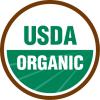
OK, EWG, I've perused your website and been warned about the produce with the most pesticide residues, as well as your list of the supposedly "cleanest" ones. And I know that you don't do the testing for pesticide residues yourselves, but rely on the USDA's Pesticide Data Program (PDP) to report the amounts of various residues on produce.
Based on these findings, you recommend that people "eat organic produce" as much as they can to limit their exposure to these chemicals — even though the amounts are so small that the chance they'd do any harm is truly minuscule. But you seem to mention only residues of synthetic pesticides — thus your preoccupation with conventionally produced produce.
What about organic pesticides?
There are many, as I'm sure you know and if you've forgotten, see the list below from the Risk-Monger:.

Why aren't you following up on the PDP's assessment of all pesticides? Granted, the amounts of organic pesticides found on produce are probably also tiny, and wouldn't hurt people consuming them any more than synthetic pesticides can, but I wonder how you can be so oblivious — or does ignoring these chemicals simply fit better with your ideology?
And, in line with ignoring data, why haven't you told us about all the synthetic pesticide residues found on organic produce, as noted by plant pathologist Dr. Steven Savage in a recent article in Forbes?
"40 different synthetic pesticide residues were detected on organic food samples at levels similar to what was seen for the comparable conventional food samples."

Shouldn't your supporters and true believers be warned about these products too? Dr. Savage also informs us that the PDP doesn't have the technology to measure all pesticides approved for use on organic products — so they don't measure them. This means that we have no way of knowing, for example, the levels of residues of sulfur, copper compounds, mineral oils, or Bt. Maybe you could find a lab that could measure them, and supply that information to us all? Of course, that would require some investment on your part, but just think of all the extra donations that would pour in!!
Sorry, EWG, but your lists don't strike me as totally honest or complete. But I guess that as long as your followers think you're providing value, why should you care?



